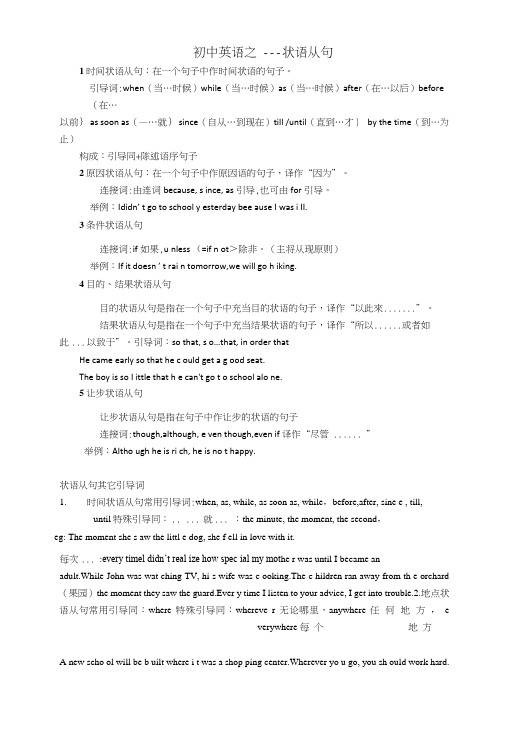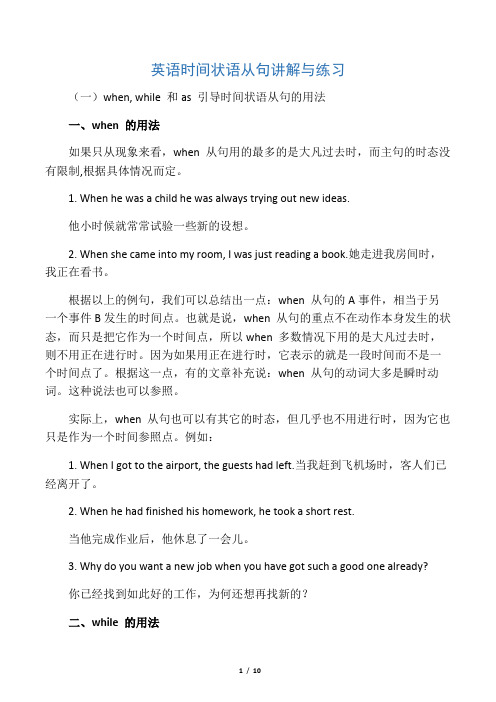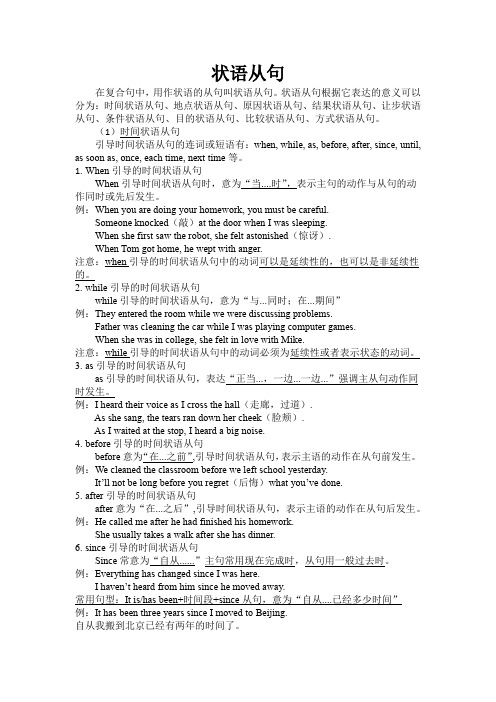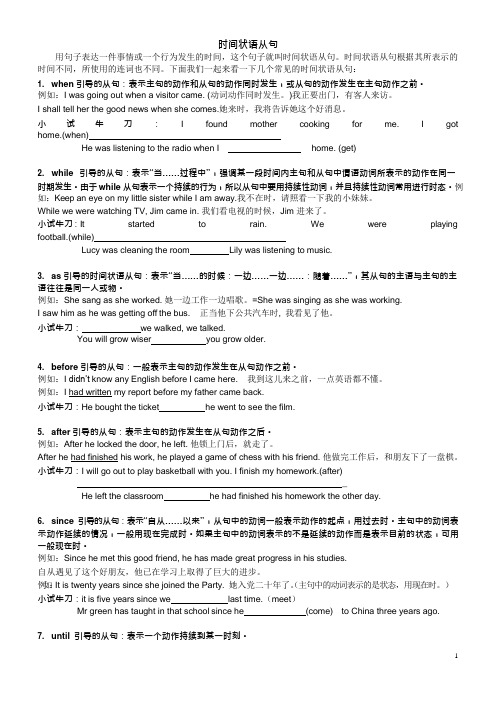初中英语时间状语从句讲解及练习.doc
2021年初中英语语法:时间状语从句解析和练习题(含答案)

2021年初中英语语法:时间状语从句解析和练习题(含答案)在句子中起时间状语作用的句子称为时间状语从句。
时间状语从句可以放在句首、句中和句尾。
引导时间状语从句的词有when、while、as、before、after、since、until/till、as soon as、once、each time、next time、the moment、immediately、instantly等。
(一)when引导的时间状语从句1)when意为“当......时”,引导时间状语从句,表示主句的动作和从句的动作同时或先后发生例句:Faith is the bird that feels the light when the dawn is still dark. 信念是黎明前的黑夜里能感受到光明的鸟儿。
例句:When I was wandering in the street, I met her. 我在街上徘徊的时候遇到了她。
2)when引导的时间状语从句中的动词可以用延续性的=动词,也可以用终止性动词例句:He was listening to the music when I went in. 当我进去的时候,他正在听音乐。
例句:I will visit my parents when I have time. 我有空时会去看望我的父母。
(二)while引导的时间状语从句While引导的时间状语从句,常译为“与......同时,在......期间”,while引导的从句常用延续性动词或表示状态的动词。
例句:They rushed in while we were discussing problems. 当我们正在讨论问题时,他们冲了进来。
例句:Make hay while the sun is shining. (谚)趁热打铁。
(三)as引导的时间状语从句As引导的时间状语从句,可以表达“正当,一边一边,随着”等意思。
初中英语状语从句讲解及练习.doc

初中英语之 --- 状语从句1时间状语从句:在一个句子中作时间状语的句子。
引导词:when(当…时候)while(当…时候)as(当…时候)after(在…以后)before(在…以前} as soon as(—…就} since(自从…到现在)till /until(直到…才}by the time(到…为止)构成:引导同+陈述语序句子2原因状语从句:在一个句子中作原因语的句子,译作“因为”。
连接词:由连词because, s ince, as引导,也可由for引导。
举例:Ididn’ t go to school y esterday bee ause I was i II.3条件状语从句连接词:if如果,u nless (=if n ot>除非。
(主将从现原则)举例:If it doesn ’ t rai n tomorrow,we will go h iking.4目的、结果状语从句目的状语从句是指在一个句子中充当目的状语的句子,译作“以此來.......”。
结果状语从句是指在一个句子中充当结果状语的句子,译作“所以......或者如此... 以致于”。
引导词:so that, s o…that, in order thatHe came early so that he c ould get a g ood seat.The boy is so I ittle that h e can't go t o school alo ne.5让步状语从句让步状语从句是指在句子中作让步的状语的句子连接词:though,although, e ven though,even if 译作“尽管 ...... ”举例:Altho ugh he is ri ch, he is no t happy.状语从句其它引导词1.时间状语从句常用引导词:when, as, while, as soon as, while,before,after, sine e , till,until 特殊引导同:.. ... 就... :the minute, the moment, the second,eg: The moment she s aw the littl e dog, she f ell in love with it.每次... :every timel didn’t real ize how spec ial my mot he r was until I became anadult.While John was wat ching TV, hi s wife was c ooking.The c hildren ran away from th e orchard (果园)the moment they saw the guard.Ever y time I listen to your advice, I get into trouble.2.地点状语从句常用引导同:where特殊引导同:whereve r无论哪里,anywhere 任何地方,everywhere 每个地方A new scho ol will be b uilt where i t was a shop ping center.Wherever yo u go, you sh ould work hard.状语从句练习单项选择1.John does n't letever ybodyinthe kitchen __________ h e could makehis sur prisedinner fortheparty.A. which B. when C. so that D. as if 2.I wouldt hankit __________ you call back this a fternoon for the doctor5 smeeting.A.until B. if C. when D. that3.Asfar as Iam concerned (就我而言),education is about learning and the more you learn,—____ A. the betterlife will you get B. the betterlife you will ge tC. you will get the bet ter lifeD.will you get the bet ter life4.Af ter the war, a new school wasbuilt _____________ t here had once be en(曾经有)a theatre.A. that B. where C . which D. whe n5.—Is Mr.Smith in the office?—Yes , __________ he is in charg e of the office, he mustbe there.A.since B. how ever C. whether D. for 6.As your good friendJ will do ____________help you.A. that I can to B. what I canto C. all that I can D. what I can7.Someone called me up in the middle ofthe night, b ut they hung up(挂断电话)____________ I coul d answer the phone.A.as B.since C. until D. before8.We must hurry up __________catchup with the last train.A. that B. so that to C. in order that D. in ord er toLondon 9.No m atter ________ h ard it ma y be, I will carry it out .A. what B. whatev er C.how D. however 1 0. _________you may do, you must do itwell.A. Which B.Whenever C. What ever D.WhenM. ________ you are so weak, you’d better sta y at home.A.Since B. For C. B ecause D. Though 1 5.1saw Mr.Smith last S unday. We had not seen each other ____________ I left .A. as B. before C.since D. till 16.1’11 be back before you ________ .A.will leave B will have left C.leave D. would lea vel7.If the weather ____________ tomor row, we will go picnic i n the centra 1 park.A wil 1 be fine Bis fine Cis going to be fine D h ave been fine18. ________________________ They wen t on working it was late at night.A. eve n if B.as if C. however D. as tho ughl9.l hurr ied _____________ I wouldn't b e late for c lass.A. sine e B. sotha t C.as if D . unless20.T he volleybal I match will be put off if it __________ .A. will r ain B. rain s C. r ained D. is raining【实例解析】1.(2004年北京市海淀区中考试题)You will sta y healthy ________ you do more exerci se, such as running and walking.A.ifB. howC. beforeD. where2.(2004年江丙省中考试题)…Shall we go on wor king?Ye s, _________ I prefer to have a rest.A. whenB. ifC. be causeD. th ough3.(2004年徐州市中考试题)N one of us kn ew what had happened ___________ they told us abo ut it.A. w henB. unti IC. afterD. though4.(2004年泉州市中考试题)••-1 ho pe you’ll en joy your tri p, dear!—Thank you,mum. Til gi ve you a cal I ___________ I get there.A. untilB. as soon a sC. sinceD. till【中考演练】一.单项填空1. ______ he z s old, he c an still car ry this heav y bag.A. T houghB. Si neeC. ForD. So2.•■-Do you know if he ______ to play ba sket ball wi th us?---1 think he wi II come if h e _______ fre e tomorrow.A. comes; i sB. comes;will beC.will come;isD. will come; will b e3.In the z oo if a chil d _____ into the water a nd can't swi m, the dolph ins may come up _________ him.A. will fall; to he IpB. fall s; to helpC. will fall; help D . falls; hel ping4.1don z t remember _________ he worked in th at city when he was youn g.A. whatB. which C . where D.who5.We wil I stay at ho me if my aunt __________ to visit us t omorrow.esB. c omeC. will comeD. is coming6.Th e police ask ed the child ren _______ cross the st reet _________ the traffi c lights tur ned green.A. not; befo reB. don't; whenC. n ot to; untilD. not; af ter7.1was late for cla ss yesterday ________ t he re was somet hing wrong w ith my bike.A. when B . that C. u ntil D. bee ause8.I’ll go swimming with you if I _________ f ree tomorrow .A. will b eB. shall beC. am D . was9.In t he exam, the ________ yo u are, _______ the ________ mistakes y ou will make .A. carefu I; littleB. more ca reful; fewes tC. more c areful; fewe rD. more c a ref u I; less10.You shou Id finish yo ur lessons _______ you g o out to pal y.A. beforeB. afterC. whenD.while11.1hurried _____ I wouldn't be late for class.A.sinceB. s o thatC. a s ifD. uni ess12.When you read the book, you'd better make a mark ________ you have any questio ns.A. whi chB. thatC. where D . though13.The teacher raised his v oice ________ a ll the stu dents could hear him.A. forB. s o thatC. b ecauseD. i n order14.H e took off h is coat ________ h e felt hot.A. be causeB. asC. ifD.since15.It is ______ th at we'd like to go out f or a walk.A. a lovely dayB. t oo lovely a dayC. so lovely a dayD. such Io vely a day16 . Mary had _______ m uch w ork to do th at she staye d at her off ice all day.A. suchB.soC. tooD. very17.______ I fel t very tired , I tried to finish the work.A. AlthoughB.BecauseC.AsD. As if18.______ t he day went on, the weat her got wors e.A. WithB. SinceC. WhileD.As19.______ well you c an drive, yo u must drive carefully.A. So long asB.ln order tha tC. No ma tter how D . The momentBeijing20. Write to me as soon as you _________ to.A . will get B. get C. g etting D. g ot二.根据中文意思完成下列英语句子1.不管他跟我开什麽玩笑,我都不生气。
初中时间状语从句语法及练习教案资

英语时间状语从句讲解与练习(一)when, while 和as 引导时间状语从句的用法一、when 的用法如果只从现象来看,when 从句用的最多的是大凡过去时,而主句的时态没有限制,根据具体情况而定。
1. When he was a child he was always trying out new ideas.他小时候就常常试验一些新的设想。
2. When she came into my room, I was just reading a book.她走进我房间时,我正在看书。
根据以上的例句,我们可以总结出一点:when 从句的A事件,相当于另一个事件B发生的时间点。
也就是说,when 从句的重点不在动作本身发生的状态,而只是把它作为一个时间点,所以when 多数情况下用的是大凡过去时,则不用正在进行时。
因为如果用正在进行时,它表示的就是一段时间而不是一个时间点了。
根据这一点,有的文章补充说:when 从句的动词大多是瞬时动词。
这种说法也可以参照。
实际上,when 从句也可以有其它的时态,但几乎也不用进行时,因为它也只是作为一个时间参照点。
例如:1. When I got to the airport, the guests had left.当我赶到飞机场时,客人们已经离开了。
2. When he had finished his homework, he took a short rest.当他完成作业后,他休息了一会儿。
3. Why do you want a new job when you have got such a good one already?你已经找到如此好的工作,为何还想再找新的?二、while 的用法相比于when 来说,while 从句的侧重点就不一样了。
while 从句的侧重点在于描述动作正在发生的状态,它的意思是:当while 事件正在发生的时候,另一件事如何如何。
初中英语状语从句讲解及典型例题

状语从句在复合句中,用作状语的从句叫状语从句。
状语从句根据它表达的意义可以分为:时间状语从句、地点状语从句、原因状语从句、结果状语从句、让步状语从句、条件状语从句、目的状语从句、比较状语从句、方式状语从句。
(1)时间状语从句引导时间状语从句的连词或短语有:when, while, as, before, after, since, until, as soon as, once, each time, next time等。
1.When引导的时间状语从句When引导时间状语从句时,意为“当....时”,表示主句的动作与从句的动作同时或先后发生。
例:When you are doing your homework, you must be careful.Someone knocked(敲)at the door when I was sleeping.When she first saw the robot, she felt astonished(惊讶).When Tom got home, he wept with anger.注意:when引导的时间状语从句中的动词可以是延续性的,也可以是非延续性的。
2.while引导的时间状语从句while引导的时间状语从句,意为“与...同时;在...期间”例:They entered the room while we were discussing problems.Father was cleaning the car while I was playing computer games.When she was in college, she felt in love with Mike.注意:while引导的时间状语从句中的动词必须为延续性或者表示状态的动词。
3.as引导的时间状语从句as引导的时间状语从句,表达“正当...,一边...一边...”强调主从句动作同时发生。
时间状语从句(含练习及答案)

以when 引导的时间状语从句- When I got home, my son had finished his homework. (主句动作发生在从句之前)- When(当...时候, 主语+did) we arrived, it was raining.- When(正当...时候,主语+be+doing) I was playing the computer games, my mum came in. - He is always nervous when he speaks to strangers.- I usually walk to school when it rains.以while 引导的时间状语从句- While I was reading, my brother was playing with his toy cars. (主从句子动作同时发生)- While/When/As he was studying in the library, I saw him. (表示一段时间时,while/when/as 可替换)while引导的从句的谓语动词必须是持续性动作:I saw him while(x) I was getting off the bus.(x)I saw him when/as I was getting off the bus.以as 引导的时间状语从句- He will grow wiser as he grows older. 随着年龄的增长,他会聪明起来。
(随着,表示时间的推移,这时,不用when/while)- He entered the room as/when/while the meeting was going on. 正当开会的时候,他走进房间。
以before引导的时间状语从句- He had washed his hands before he had dinner. (主句动作先于从句动作)- Please clean the house before you move in.以after 引导的时间状语从句- She went on holiday after she had taken the examination. (从句动作先于主句)- You can watch TV after you finish your homework.以since 引导的时间状语从句- She has been in the house since she came to the city. (主句完成时态,从句过去时)- I have taught them English since last year.以as soon as引导的时间状语从句- I will write to you as soon as I get to America. 我一到美国就会给你写信。
时间状语从句讲解和练习(答案)(可编辑修改word版)

时间状语从句用句子表达一件事情或一个行为发生的时间,这个句子就叫时间状语从句。
时间状语从句根据其所表示的时间不同,所使用的连词也不同。
下面我们一起来看一下几个常见的时间状语从句:1. when 引导的从句:表示主句的动作和从句的动作同时发生,或从句的动作发生在主句动作之前。
例如:I was going out when a visitor came. (动词动作同时发生。
)我正要出门,有客人来访。
I shall tell her the good news when she comes.她来时,我将告诉她这个好消息。
小试牛刀:I found mother cooking for me. I got home.(when)He was listening to the radio when I home. (get)2. while 引导的从句:表示“当……过程中”,强调某一段时间内主句和从句中谓语动词所表示的动作在同一时期发生。
由于while 从句表示一个持续的行为,所以从句中要用持续性动词,并且持续性动词常用进行时态。
例如:Keep an eye on my little sister while I am away.我不在时,请照看一下我的小妹妹。
While we were watching TV, Jim came in. 我们看电视的时候,Jim 进来了。
小试牛刀:It started to rain. We were playing football.(while)Lucy was cleaning the room Lily was listening to music.3. as 引导的时间状语从句:表示“当……的时候;一边……一边……;随着……”,其从句的主语与主句的主语往往是同一人或物。
例如:She sang as she worked. 她一边工作一边唱歌。
=She was singing as she was working.I saw him as he was getting off the bus. 正当他下公共汽车时, 我看见了他。
英语时间状语从句讲解与练习(完整版)

英语时间状语从句讲解与练习英语时间状语从句讲解与练习when, while 和 as 引导时间状语从句的用法这三个词的意思很简单,都有“当……时候”的意思。
但学生经常会问三个词的区别在哪儿,特别是在做选择题的时候。
别说是学生,就我个人而言,做这样的选择题要保证百分之百的正确也是不可能的。
现根据大量的实例和个人的思考,做一点小结,供大家参考。
一、when 的用法如果只从现象来看,when 从句用的最多的是一般过去时,而主句的时态没有限制,根据具体情况而定。
1. When he was a child he was always trying out new ideas. 他小时候就常常试验一些新的设想。
2. When she came into my room, I was just reading a book. 她走进我房间时,我正在看书。
3. Were you writing when the teacher came in 老师进来的时候,你在写信吗?4. Sorry, I was out when you called me. 对不起,你打电话来的时候我出去了。
5. He was on the point of leaving when someone knocked at the door. 他正要走,这时有人敲门。
6. I thought of it just when you opened your mouth. 就在你要说话的时候,我也想到了。
7. I had hardly[scarcely] closed my eyes when someone knocked at the door. 我刚一闭上眼,就有人在敲门了。
根据以上的例句,我们可以总结出一点:when 从句的A事件,相当于另一个事件B发生的时间点。
也就是说,when 从句的重点不在动作本身发生的状态,而只是把它作为一个时间点,所以when 多数情况下用的是一般过去时,则不用正在进行时。
初中状语从句之时间状语从句:知识点总结+习题(word版,无答案)

初中状语从句之时间状语从句:知识点总结+习题(word版,无答案)状语从句——时间状语从句1, 由when 或whenever 引导, when 指的是“某一具体的时间”, whenever 指的是“在任何时间”。
Eg: When I came into the room, he was writing a letter. 当我进屋时, 他正在写信。
Eg: We shall go there whenever we are free. 我们什么时间有空, 我们就去那里。
2, when 意为“这时”或“在那个时候”,可以看作是并列句,这种用法的when 分句一般位于句末。
Eg: I was walking along the street when suddenly someone patted me on the shoulder from behind.我正在街上走着, 这时忽然有人从后面拍我的肩膀。
3, while 指“在某一段时间里”, “在…期间”, while 引导的动作必须是持续性的。
Eg: While it was raining, they went out. 天下雨的时候, 他们出去了。
I stayed while he was away. 他不在的时候我在。
4, as 引导持续性动作, 强调主句和从句的动作同时发生。
Eg: He hurried home, looking behind as he went. 他赶快回家, 不时地一边走一边向后看。
5, 由before 或after 引导。
Eg: Be a pupil before you become a teacher. 先做学生, 再做先生。
Eg: He arrived after the game started. 比赛开始后, 他到了。
6, 由till 引导。
如主句动词是持续性动作, 常用肯定式, 表示“直到…为止”。
- 1、下载文档前请自行甄别文档内容的完整性,平台不提供额外的编辑、内容补充、找答案等附加服务。
- 2、"仅部分预览"的文档,不可在线预览部分如存在完整性等问题,可反馈申请退款(可完整预览的文档不适用该条件!)。
- 3、如文档侵犯您的权益,请联系客服反馈,我们会尽快为您处理(人工客服工作时间:9:00-18:30)。
语法29 时间状语从句
一、什么是状语从句
状语就是在一句话中表示该句子的时间、地点、方式、原因、条件等成分。
状语从句就是用一个从句表示状语。
状语从句根据它表达的意思不同,可分为时间、地点、原因、目的、结果、条件、方式、比较、让步等九类。
与状语一样,状语从句的位置比较灵活。
既可置于主句之前(通常用逗号与主句隔开),也课置于主句之后(不需要用逗号与主句隔开),有时甚至可以置于主句之中。
二、时间状语从句
1.主句和从句同时发生,这类从句由从属连词when, while, as引导。
He was hungry when he came home.
I was crying while everyone was laughing.
As I walked out, he walked in.
as, when, while, 的区别
①as强调从句的动作与主句动作同时发生及持续,具有at the same time的意思
他继续往下谈的时候,越来越兴奋。
as还可以表示一边……一边……,强调从句和主句中两个动作交替进行或同步进行。
他们边走边聊。
as还有“随着”的含义
随着春天的到来,天气暖和起来。
②when强调动作点的特定时间,具有at the time that的意思
当老师走进来的时候,我们都站起来了。
③while表示较长的期间,具有during the time that的意思
当我在这的时候,我很安全。
2.主句发生在从句之前,这类从句由从属连词before, until引导,before意为“在---之前”until 在肯定句中意为“直到---为止”,在否定句中意为“直到---才”。
从句既可置于主句前,也可置于主句之后。
回家之前我必须干完所有的活。
我们将一直等到他回来。
他直到晚上11点才回家。
3.主句发生在从句之后,这类从句由从属连词after引导,意为“在---之后”。
从句既可置于主句前,也可置于主句之后。
放学后我们踢足球吧。
4. 主句在从句之后立刻发生,这类从句由从属连词once, as soon as引导,意为“刚刚”,“一---就---”。
从句既可置于主句前,也可置于主句之后。
他一有空就来看你。
一有消息,我就打电话给你。
三、if引导的条件状语从句
赠送以下资料
考试知识点技巧大全
一、考试中途应饮葡萄糖水
大脑是记忆的场所,脑中有数亿个神经细胞在不停地进行着繁重的活动,大脑细胞活动需要大量能量。
科学研究证实,虽然大脑的重量只占人体重量的2%-3%,但大脑消耗的能量却占食物所产生的总能量的20%,它的能量来源靠葡萄糖氧化过程产生。
据医学文献记载,一个健康的青少年学生30分钟用脑,血糖浓度在120毫克/100毫升,大脑反应快,记忆力强;90分钟用脑,血糖浓度降至80毫克/100毫升,大脑功能尚正常;连续120分钟用脑,血糖浓度降至60毫克/100毫升,大脑反应迟钝,思维能力较差。
我们中考、高考每一科考试时间都在2小时或2小时以上且用脑强度大,这样可引起低血糖并造成大脑疲劳,从而影响大脑的正常发挥,对考试成绩产生重大影响。
因此建议考生,在用脑60分钟时,开始补饮25%浓度的葡萄糖水100毫升左右,为一个高效果的考试加油。
二、考场记忆“短路”怎么办呢?
对于考生来说,掌握有效的应试技巧比再做题突击更为有效。
1.草稿纸也要逐题顺序写草稿要整洁,草稿纸使用要便于检查。
不要在一大张纸上乱写乱画,东写一些,西写一些。
打草稿也要像解题一样,一题一题顺着序号往下写。
最好在草稿纸题号前注上符号,以确定检查侧重点。
为了便于做完试卷后的复查,草稿纸一般可以折成4-8块的小方格,标注题号以便核查,保留清晰的分析和计算过程。
2.答题要按先易后难顺序不要考虑考试难度与结果,可以先用5分钟熟悉试卷,合理安排考试进度,先易后难,先熟后生,排除干扰。
考试中很可能遇到一些没
有见过或复习过的难题,不要蒙了。
一般中考试卷的题型难度分布基本上是从易到难排列的,或者交替排列。
3.遇到容易试题不能浮躁遇到容易题,审题要细致。
圈点关键字词,边审题边画草图,明确解题思路。
有些考生一旦遇到容易的题目,便觉得心应手、兴奋异常,往往情绪激动,甚至得意忘形。
要避免急于求成、粗枝大叶,防止受熟题答案与解题过程的定式思维影响,避免漏题,错题,丢掉不该丢的分。
4. 答题不要犹豫不决选择题做出选择时要慎重,要关注题干中的否定用词,对比筛选四个选项的差异和联系,特别注意保留计算型选择题的解答过程。
当试题出现几种疑惑不决的答案时,考生一定要有主见,有自信心,即使不能确定答案,也不能长时间犹豫,浪费时间,最终也应把认为正确程度最高的答案写到试卷上,不要在答案处留白或开天窗。
5.试卷检查要细心有序应答要准确。
一般答题时,语言表达要尽量简明扼要,填涂答题纸绝不能错位。
答完试题,如果时间允许,一般都要进行试卷答题的复查。
复查要谨慎,可以利用逆向思维,反向推理论证,联系生活实际,评估结果的合理性,选择特殊取值,多次归纳总结。
另外,对不同题型可采用不同的检查方法。
选择题可采用例证法,举出一两例来能分别证明其他选项不对便可安心。
对填空题,则一要检查审题;二要检查思路是否完整;三要检查数据代入是否正确;四要检查计算过程;五要看答案是否合题意;
六要检查步骤是否齐全,符号是否规范。
还要复查一些客观题的答案有无遗漏,答案错位填涂,并复核你心存疑虑的项目。
若没有充分的理由,一般不要改变你依据第一感觉做出的选择。
6、万一记忆短路可慢呼吸考试中,有些考生因为怯场,导致无法集中精神,甚至大脑忽然一片空白,发生记忆堵塞。
此时不要紧张,不妨尝试如下方式:
首先是稳定心态,保持镇静,并注意调节自己的呼吸率。
先慢吸气,当对自己说放松时缓慢呼气,再考虑你正在努力回忆的问题,如果你仍不能回想起来,就暂时搁下这道题,开始选做其他会的试题,过段时间再回过头来做这道题。
第二,积极联想。
你不妨回忆老师在讲课时的情景或自己的复习笔记,并努力回忆与发生记忆堵塞问题有关的论据和概念,把回忆起的内容迅速记下来,然后,看能否从中挑出一些有用的材料或线索。
第三,进行一分钟自我暗示。
即根据自己的实际,选择能激励自己,使自己能心情平静和增强信心的话,在心中默念3至5遍。
比如:我已平静下来,我能够考好、我有信心,一定能考出理想的成绩等等。
第四,分析内容,查找相关要点。
借助试卷上其它试题,也许会给考生提供某些线索。
因此不要轻易放弃,查看试题中的相关要点,看看是否能给考生提供线索或启发。
